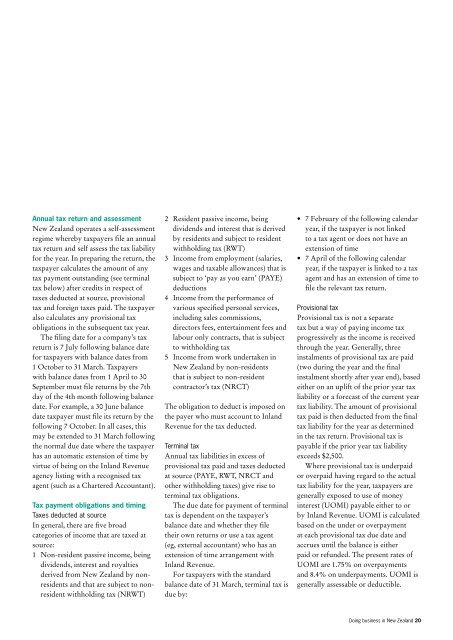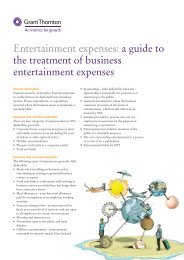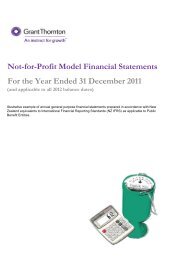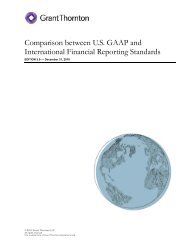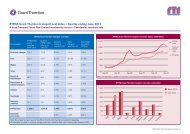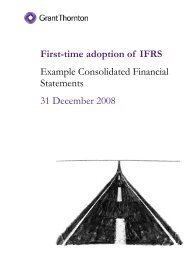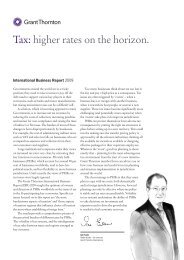Doing business in New Zealand - Grant Thornton
Doing business in New Zealand - Grant Thornton
Doing business in New Zealand - Grant Thornton
You also want an ePaper? Increase the reach of your titles
YUMPU automatically turns print PDFs into web optimized ePapers that Google loves.
Annual tax return and assessment<br />
<strong>New</strong> <strong>Zealand</strong> operates a self-assessment<br />
regime whereby taxpayers file an annual<br />
tax return and self assess the tax liability<br />
for the year. In prepar<strong>in</strong>g the return, the<br />
taxpayer calculates the amount of any<br />
tax payment outstand<strong>in</strong>g (see term<strong>in</strong>al<br />
tax below) after credits <strong>in</strong> respect of<br />
taxes deducted at source, provisional<br />
tax and foreign taxes paid. The taxpayer<br />
also calculates any provisional tax<br />
obligations <strong>in</strong> the subsequent tax year.<br />
The fil<strong>in</strong>g date for a company’s tax<br />
return is 7 July follow<strong>in</strong>g balance date<br />
for taxpayers with balance dates from<br />
1 October to 31 March. Taxpayers<br />
with balance dates from 1 April to 30<br />
September must file returns by the 7th<br />
day of the 4th month follow<strong>in</strong>g balance<br />
date. For example, a 30 June balance<br />
date taxpayer must file its return by the<br />
follow<strong>in</strong>g 7 October. In all cases, this<br />
may be extended to 31 March follow<strong>in</strong>g<br />
the normal due date where the taxpayer<br />
has an automatic extension of time by<br />
virtue of be<strong>in</strong>g on the Inland Revenue<br />
agency list<strong>in</strong>g with a recognised tax<br />
agent (such as a Chartered Accountant).<br />
Tax payment obligations and tim<strong>in</strong>g<br />
Taxes deducted at source<br />
In general, there are five broad<br />
categories of <strong>in</strong>come that are taxed at<br />
source:<br />
1 Non-resident passive <strong>in</strong>come, be<strong>in</strong>g<br />
dividends, <strong>in</strong>terest and royalties<br />
derived from <strong>New</strong> <strong>Zealand</strong> by nonresidents<br />
and that are subject to nonresident<br />
withhold<strong>in</strong>g tax (NRWT)<br />
2 Resident passive <strong>in</strong>come, be<strong>in</strong>g<br />
dividends and <strong>in</strong>terest that is derived<br />
by residents and subject to resident<br />
withhold<strong>in</strong>g tax (RWT)<br />
3 Income from employment (salaries,<br />
wages and taxable allowances) that is<br />
subject to ‘pay as you earn’ (PAYE)<br />
deductions<br />
4 Income from the performance of<br />
various specified personal services,<br />
<strong>in</strong>clud<strong>in</strong>g sales commissions,<br />
directors fees, enterta<strong>in</strong>ment fees and<br />
labour only contracts, that is subject<br />
to withhold<strong>in</strong>g tax<br />
5 Income from work undertaken <strong>in</strong><br />
<strong>New</strong> <strong>Zealand</strong> by non-residents<br />
that is subject to non-resident<br />
contractor’s tax (NRCT)<br />
The obligation to deduct is imposed on<br />
the payer who must account to Inland<br />
Revenue for the tax deducted.<br />
Term<strong>in</strong>al tax<br />
Annual tax liabilities <strong>in</strong> excess of<br />
provisional tax paid and taxes deducted<br />
at source (PAYE, RWT, NRCT and<br />
other withhold<strong>in</strong>g taxes) give rise to<br />
term<strong>in</strong>al tax obligations.<br />
The due date for payment of term<strong>in</strong>al<br />
tax is dependent on the taxpayer’s<br />
balance date and whether they file<br />
their own returns or use a tax agent<br />
(eg, external accountant) who has an<br />
extension of time arrangement with<br />
Inland Revenue.<br />
For taxpayers with the standard<br />
balance date of 31 March, term<strong>in</strong>al tax is<br />
due by:<br />
• 7 February of the follow<strong>in</strong>g calendar<br />
year, if the taxpayer is not l<strong>in</strong>ked<br />
to a tax agent or does not have an<br />
extension of time<br />
• 7 April of the follow<strong>in</strong>g calendar<br />
year, if the taxpayer is l<strong>in</strong>ked to a tax<br />
agent and has an extension of time to<br />
file the relevant tax return.<br />
Provisional tax<br />
Provisional tax is not a separate<br />
tax but a way of pay<strong>in</strong>g <strong>in</strong>come tax<br />
progressively as the <strong>in</strong>come is received<br />
through the year. Generally, three<br />
<strong>in</strong>stalments of provisional tax are paid<br />
(two dur<strong>in</strong>g the year and the f<strong>in</strong>al<br />
<strong>in</strong>stalment shortly after year end), based<br />
either on an uplift of the prior year tax<br />
liability or a forecast of the current year<br />
tax liability. The amount of provisional<br />
tax paid is then deducted from the f<strong>in</strong>al<br />
tax liability for the year as determ<strong>in</strong>ed<br />
<strong>in</strong> the tax return. Provisional tax is<br />
payable if the prior year tax liability<br />
exceeds $2,500.<br />
Where provisional tax is underpaid<br />
or overpaid hav<strong>in</strong>g regard to the actual<br />
tax liability for the year, taxpayers are<br />
generally exposed to use of money<br />
<strong>in</strong>terest (UOMI) payable either to or<br />
by Inland Revenue. UOMI is calculated<br />
based on the under or overpayment<br />
at each provisional tax due date and<br />
accrues until the balance is either<br />
paid or refunded. The present rates of<br />
UOMI are 1.75% on overpayments<br />
and 8.4% on underpayments. UOMI is<br />
generally assessable or deductible.<br />
<strong>Do<strong>in</strong>g</strong> <strong>bus<strong>in</strong>ess</strong> <strong>in</strong> <strong>New</strong> <strong>Zealand</strong> 20


